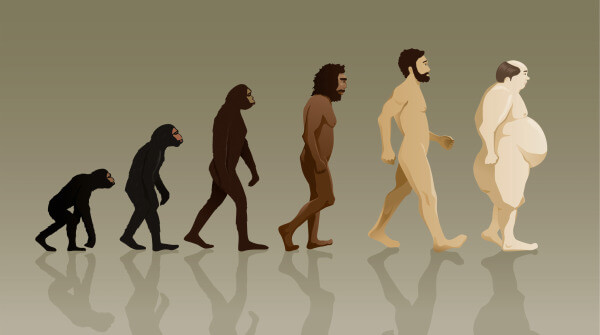
Humankind gradually evolved during the Paleolithic era. Paleolithic hunting and gathering peoples ate primarily meat, fish, shellfish, leafy vegetables, fruit, nuts and insects in varying proportions.
The Paleolithic diet (also known as the paleodiet or the caveman diet) is a modern diet that seeks to eliminate diseases of affluence from contemporary industrial society, by replicating the dietary habits of Paleolithic hunter-gatherers. By this we usually refer to type 2 diabetes, coronary heart disease and cerebrovascular disease, because they ate mostly lean meats and plants and frequently engaged in intense physical activity.
So the theory goes that since the homo sapien appeared about 200,000 years ago our metabolic requirements haven’t changed that much despite the obvious transformation in our lifestyles.
Try typing paleolithic diet into a google search and see how popular the movement has become….everyone from dieters and athletes through to the office worker and mum at home are trying this one. Its reaching Atkins proportions!
Personally i love the fact that people have recognised how to improve the foods we have to eat and are moving in the right direction to fix it. What needs to happen now is an equally popular yet much more sustainable safety net diet plan needs to be promoted to catch the people who fall off the paleolithic wagon and provide a stepping stone for those who want to try it. As i see it,the problem is that unlike the first homo sapiens food for us has turned into a pleasure rather than a functionality. Meaning we place emphasis on the way it is prepared, tastes and presented. And lets be honest a huge hunk of meat, with a side serving of grains aint exactly nuvo is it?
So its sustaining the diet which seems to be the problem, mostly the problem with most diets. Id like to see it not being called the paleolithic diet but instead something like “the way of the homo sapien” or how about “nutrition for humans” I think we should be re-educating the kids with this stuff….when the hell is that food pyramid going to go? everyone’s been talking about it for over a decade….but no ones got the gumption to screw the dairy industry and come to mention it the pharmaceutical industry either. Anyway staying on the topic of the day the following is a list of the dos and donts of the way of the homo sapien:
Meats and Eggs
Meats (including seafood) and eggs are perhaps the most important components of the Paleolithic Diet. Ideally, the animals from which the eggs and meat come from are fed a natural (to the animal) organic diet. That is, chickens have access to greens, insects, etc, as well as grain. Cattle eat grass and other pasture greenery. Fish should come from the wild, or at least be fed what wild fish eat.
In any case, meats should be free of breading of any kind.
Loren Cordain (The Paleo Diet) believes we should seek out low-fat meat sources, while others disagree. His reasoning is that today’s meats are much higher in saturated fat so we should seek out low fat meats and then supplement with fats from other sources.
Vegetables
Vegetables are encouraged, although some versions of the diet except green beans and peas as they are legumes. Some versions simply say that if it can’t be eaten raw, don’t eat it (though this doesn’t mean that it must be eaten raw, only that it should be able to be eaten raw). Potatoes and other starchy tubers (e.g. cassava) are not allowed.
Fruits
Fruits are generally allowed. Audette (NeanderThin) advises that people who need to lose weight should limit consumption of high sugar fruits. He allows juices in limited quantities. Cordain suggests avoiding juices altogether and limiting dried fruits.
Nuts and Seeds
Nuts and seeds are generally allowed, though Cordain suggests that those who want to lose weight limit them to four ounces per day. Note that peanuts are legumes and NOT allowed. Audette doesn’t allow cashews since they can’t be eaten raw. Unsweetened almond milk and coconut milk are often used as substitutes for dairy.
Oils
Though authors vary on recommended oils, basically the consensus seems to be that the oils from allowed plants are fine. Olive oil, nut oils, and flax seed oil are universally endorsed. Cordain recommends canola oil, but not coconut oil. Fish oil supplements are often recommended.
Beverages
Cordain is much more lenient about beverages than Audette. With Audette, it’s water and tea, and limited quantities of juice – specifically no coffee and no alcohol. Cordain anything other than water should only be drunk in moderation, with the following recommendations.
•Diet soda (very controversial in the Paleo community from what I can tell)
•Coffee
•Tea
Also, although in one place Cordain says alcohol “should be limited to an occasional glass of wine, beer, or spirits”, in another place in the book he defines moderation as:
•Wine – 2 4 oz glasses
•Beer – 1 12 oz serving
•Spirits – 4 oz (which is more than is recommended by anyone else, Paleo or not)